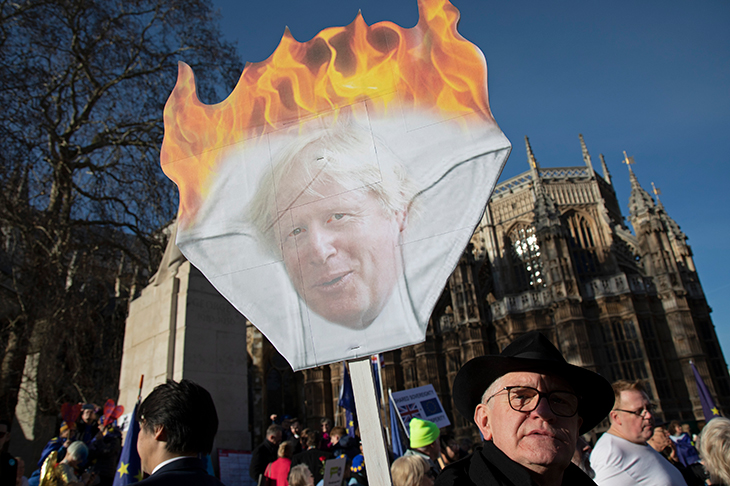I switched on the radio last week and caught the tail end of a discussion about the Conservative leadership election. The presenter, who seemed to be in a highly agitated state, was talking about one of the contenders: ‘A man who’s lied to both of his wives, all of his mistresses, every constituent, every employer, every party leader, every colleague, every interviewer, every journalist he’s ever encountered, he’s not just lied to them, he’s actively agitated to deceive them…’ On it went. Even by left-wing shock jock standards, it was unhinged. He could only have been talking about Boris Johnson.
In the US, Trump Derangement Syndrome, or TDS, is a well-established phenomenon. The journalist Fareed Zakaria defined it as ‘hatred of President Trump so intense that it impairs people’s judgment’ and it has led to well-respected columnists describing him as a ‘fascist’, a ‘white supremacist’ and a ‘Nazi’. ‘Just how similar is Trump to Hitler?’ asked an opinion piece in TIME magazine after his election. Some people were so badly affected by Trump’s victory it made them psychologically ill. Students at Kansas University were offered ‘therapy dogs’ on election night, while at Vanderbilt they were encouraged ‘to take advantage of the outstanding mental health support the university offers’.
So far, Boris Derangement Syndrome, or BDS, hasn’t reached those heights, but we’re not far off. In a New York Times article last July entitled ‘Boris Johnson has ruined Britain’, a prominent, left-of-center British journalist took issue with his decision to resign as foreign secretary. ‘It is a desperate move by a man who has lost almost all the credibility he had three years ago,’ she wrote. ‘As one of his allies told me last month: “He knows that the verdict of history is about to come down on him — and bury him.”’
Could the eagerness with which other journalists write Boris off, convinced he is destined to fail in politics, be prompted by a jealous contempt for anyone who ceases to be a spectator and steps into the arena?
It isn’t just leftist commentators suffering from BDS. One of the curious things about the phenomenon is that otherwise sensible pundits are also afflicted. Matthew Parris, for instance, recently described Boris as an ‘incompetent scoundrel’, a ‘rascal’ and a ‘rat’ — and that was just in one column — while a former editor of this magazine blamed him for, among other things, failing to boost spending on the NHS by £350 million a week.
Another form BDS takes is to portray Boris as a rich toff who’s out of touch. ‘Boris Johnson would not live down your street, he would not let his children go to school with yours, he does not hang out where you hang out and he would not be your friend,’ tweeted a Labour MP last week. A slightly mystifying tirade, given that, until recently, Boris lived in the same London borough as Jeremy Corbyn and Emily Thornberry and sent his children to the local primary. ‘Once you’ve been to public school, then you are from postcode POSH,’ wrote the Guardian’s Zoe Williams — an odd charge given that Zoe went to Godolphin and Latymer, a £21,000-a-year London day school.
However, the most bizarre manifestations of BDS are when Boris’s detractors accuse him of racism, misogyny and homophobia. This usually involves a Herculean amount of offense archaeology, with determined opponents sifting through every word he’s ever written to look for quotes they can take out of context and use as Exhibits A, B and C in the case for the prosecution.
A case in point is a column last year in which he used the phrases ‘letter boxes’ and ‘bank robbers’ to describe burka-wearing women. This has been widely portrayed by his enemies as an attack on Muslims and cited as ‘proof’ of his Islamophobia, overlooking the fact that he was referring specifically to the niqab and the column in question was arguing against a burka ban.
We saw another example of this misrepresentation last weekend when Channel 4 News asked the two lesbians assaulted on a London bus what they thought of him, having first explained to them that Boris was a ‘homophobe’ and a ‘misogynist’. Not surprisingly, they concluded he was unfit to lead anything, let alone Britain.
Sometimes, the damning quotes are taken from articles that appeared in The Spectator when he was editor but weren’t by him — such as a poem by James Michie describing the Scots as ‘verminous’. But, as his colleagues could attest, Boris’s only shortcoming as editor was not reading all the copy before it appeared in print.
This grotesque portrait of Boris is typical of the way in which some sections of the chattering classes have persuaded themselves we’re in the middle of a culture war in which they’ve cast him as a right-wing populist in the same mould as Viktor Orbán. But if you contrast Boris’s politically incorrect language with his record in office, that caricature doesn’t survive. On the contrary, when it comes to the big culture war issues — gay rights, abortion, migration — he is on the same side as the metropolitan elite.
Ultimately, this unwillingness to make any effort to understand Boris or his election-winning appeal may be his greatest asset. Again and again, his political enemies have sought to portray him as a far-right rabble-rouser but haven’t been able to make it stick.
He simply doesn’t look like a demagogue from central casting — less Benito Mussolini than Bertie Wooster. Boris may seem befuddled, but his greatest skill as a politician has been to befuddle his opponents, transforming them into furious scolds and leaving them at a loss as to how to defeat him. Long may it continue.
This article was originally published in The Spectator magazine.


















